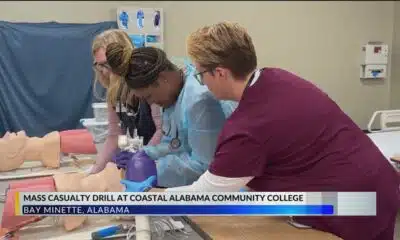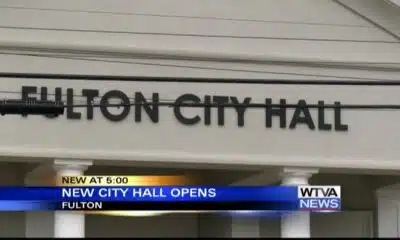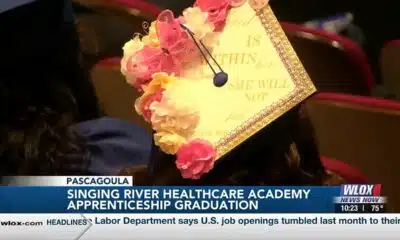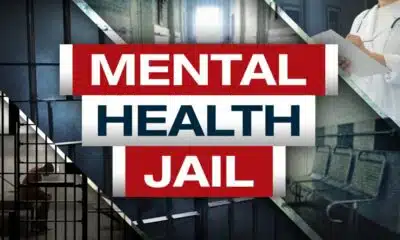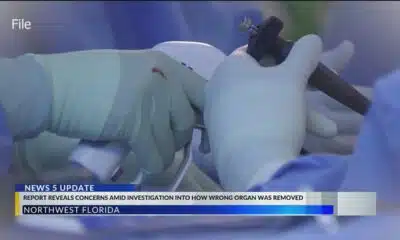Mississippi News
Mental health advocates want input on relief spending
Mental health advocates want input on how federal funds are spent
Advocates want Mississippians who rely on mental health services to have a say in how the embattled Department of Mental Health spends $104.5 million in proposed federal relief funds, and they’re hoping the Legislature will make it happen.
On Feb. 11, leaders of four advocacy groups sent a letter to Lt. Gov. Delbert Hosemann and Speaker Philip Gunn asking them to create a “stakeholder committee” to advise DMH on its spending of the American Rescue Plan Act money and monitor the outcomes. Members would include service recipients and their families, care providers, community health centers, law enforcement and others.
“This inclusive and holistic approach would increase the likelihood of better outcomes for people with mental illness and their families,” wrote the leaders of Disability Rights Mississippi, Families As Allies, the Mississippi Coalition for Citizens with Disabilities, and the Mississippi Psychiatric Association.
The federal money would flow to DMH, which employs more people than any other state agency, as it works to expand community-based mental health services.
In 2016, the Justice Department sued the state for violating the Americans with Disabilities Act by forcing people with mental illness to seek care in “segregated state hospitals,” far from their homes and loved ones. In 2019, U.S. District Judge Carlton Reeves ruled that DMH had violated the rights of Mississippians with severe mental illness.
Reeves last year ordered the appointment of an independent monitor to verify DMH’s data and evaluate its progress in providing community-based services. But the state is fighting that order with an appeal to the 5th Circuit.
In her presentation to the ARPA subcommittee in December, DMH Director Wendy Bailey proposed using funds to add 60 beds at crisis stabilization units to help divert people from state hospitals, train first responders in mental health first aid, implement the 988 suicide prevention lifeline as it launches in July 2022, and address the agency’s staffing shortage.
Joy Hogge leads Families As Allies, a statewide nonprofit that advocates for children with behavioral health challenges and their families. Hogge said the ARPA money could make a big difference for Mississippians seeking mental health services — if it’s used thoughtfully. Adding services that can’t outlive a temporary funding boost would be a mistake, she said. Tracking outcomes is important, too.
“Ten years from now we could look (and say), ‘Yes, things did get better, more people are getting services, there are more providers, we’re growing this,’” she said. “As opposed to just — here’s some services that might go away in just a few years and we don’t even know if it actually helped.”
Adam Moore, communications director for DMH, said the agency regularly gets feedback from service recipients and other stakeholders through a statewide survey and meetings with advisory councils that include family advocacy groups.
Bailey was copied on the advocates’ letter.
“DMH has not directly responded to the letter as it was not addressed to the agency, but we are prepared to share any information regarding our ARPA funds proposal as needed,” he said in a statement to Mississippi Today. “If the agency receives the funds, DMH will also track outcomes related to the services/supports provided through the use of the funds and will report that information publicly.”
Senate Bill 2865 would give broad discretion for the Department to spend about $86 million. An additional $18.5 million is earmarked for the Community Mental Health Centers.
The bill requires the department to consult with at least one outsider as it determines how to spend the money earmarked for community mental health centers: the coordinator of mental health accessibility, Bill Rosamond, a position created by the legislature in 2020.
As Mississippi backs away from institutionalizing people, the state’s 13 Community Mental Health Centers are increasingly important: The centers operate mobile crisis response teams and intensive services for people with severe mental illness. The department is shifting funding to expand their work.
Bailey has said she plans to continue following the court’s orders despite the state’s appeal.
“Most anything and everything we can do to divert from state hospitals and provide services in the community, that is what we are going to do,” she said in September.
In its appeal, the state argues that community-based services are already available and that Reeves had subjected the system to “perpetual federal oversight.”
But Hogge and other advocates say it’s too early to say the system is working.
Reeves appointed Dr. Michael Hogan as a “special master,” an official tasked with gathering information to inform a court’s decisions.
In his June 2021 report to the court, Hogan, who had tried unsuccessfully to help DMH and the Department of Justice agree on a remedial plan, wrote that Mississippi had made improvements over the last few years, such as reducing the number of people staying in state hospitals for long periods of time.
But he concluded that the full picture of community services isn’t yet clear.
“Data on community service performance is not yet adequate to assess performance or to allow the Court to determine if the requirements of the ADA are being met,” he wrote. “Levels of services that are in place have not been verified. The actual availability of services to Mississippians is not yet certain.”
Polly Tribble, the executive director of Disability Rights Mississippi, the organization charged by Congress with advocating for people with disabilities in the state, said she wants to see the ARPA funds help accelerate the growth of community-based services.
“We don’t want that money to go into facilities,” she said. “We want it to go into services that are really helping people in the community.”
In addition to the creation of the stakeholder group, the advocates are asking DMH to use the money to strengthen the system’s infrastructure, not to provide temporary services. They are also requesting DMH be required to report outcomes to the legislature and the stakeholder group.
The advocates’ letter asks that their proposed stakeholder committee work with Rosamond and special master Hogan to help plan the ARPA spending.
SB 2865 is now with the House Appropriations Committee. The advocates hope the letter could lead to changes in the appropriations bill before it is passed.
Hogge said as of Thursday, there have been no substantive conversations about implementing the letter’s suggestions.
“I always try to be optimistic that there’s possibilities that anything can happen,” she said. “But just based on what I’ve seen, I’m not really leaning towards that is what’s going to happen. I certainly hope it is, and I think that would be the right thing to do.”
This article first appeared on Mississippi Today and is republished here under a Creative Commons license.
Mississippi News
Suspect in Charlie Kirk assassination believed to have acted alone, says Utah governor
SUMMARY: Tyler Robinson, 22, was arrested for the targeted assassination of conservative activist Charlie Kirk in Orem, Utah. Authorities said Robinson had expressed opposition to Kirk’s views and indicated responsibility after the shooting. The attack occurred during a Turning Point USA event at Utah Valley University, where Kirk was shot once from a rooftop and later died in hospital. Engravings on bullets and chat messages helped link Robinson to the crime, which was captured on grim video. The killing sparked bipartisan condemnation amid rising political violence. President Trump announced Robinson’s arrest and plans to award Kirk the Presidential Medal of Freedom.
The post Suspect in Charlie Kirk assassination believed to have acted alone, says Utah governor appeared first on www.wjtv.com
Mississippi News
Americans mark the 24th anniversary of the 9/11 attacks with emotional ceremonies
SUMMARY: On the 24th anniversary of the 9/11 attacks, solemn ceremonies were held in New York, at the Pentagon, and in Shanksville to honor nearly 3,000 victims. Families shared personal remembrances, emphasizing ongoing grief and the importance of remembrance. Vice President JD Vance postponed his attendance to visit a recently assassinated activist’s family, adding tension to the day. President Trump spoke at the Pentagon, pledging never to forget and awarding the Presidential Medal of Freedom posthumously. The attacks’ global impact reshaped U.S. policy, leading to wars and extensive health care costs for victims. Efforts continue to finalize legal proceedings against the alleged plot mastermind.
The post Americans mark the 24th anniversary of the 9/11 attacks with emotional ceremonies appeared first on www.wcbi.com
Mississippi News
Hunt for Charlie Kirk assassin continues, high-powered rifle recovered
SUMMARY: Charlie Kirk, conservative influencer and Turning Point USA founder, was fatally shot by a sniper during a speech at Utah Valley University on September 10, 2025. The shooter, believed to be a college-aged individual who fired from a rooftop, escaped after the attack. Authorities recovered a high-powered rifle and are reviewing video footage but have not identified the suspect. The shooting highlighted growing political violence in the U.S. and sparked bipartisan condemnation. Kirk, a Trump ally, was praised by political leaders, including Trump, who called him a “martyr for truth.” The university was closed and security heightened following the incident.
The post Hunt for Charlie Kirk assassin continues, high-powered rifle recovered appeared first on www.wjtv.com
-
News from the South - Kentucky News Feed6 days ago
Lexington man accused of carjacking, firing gun during police chase faces federal firearm charge
-
News from the South - Arkansas News Feed7 days ago
Group in lawsuit say Franklin county prison land was bought before it was inspected
-
The Center Square6 days ago
California mother says daughter killed herself after being transitioned by school | California
-
News from the South - Missouri News Feed6 days ago
Local, statewide officials react to Charlie Kirk death after shooting in Utah
-
Local News6 days ago
US stocks inch to more records as inflation slows and Oracle soars
-
News from the South - Arkansas News Feed6 days ago
Arkansas medical marijuana sales on pace for record year
-
Local News Video6 days ago
William Carey University holds 'tailgates and tourniquets' blood drive
-
News from the South - Alabama News Feed6 days ago
Zaxby's Player of the Week: Dylan Jackson, Vigor WR




